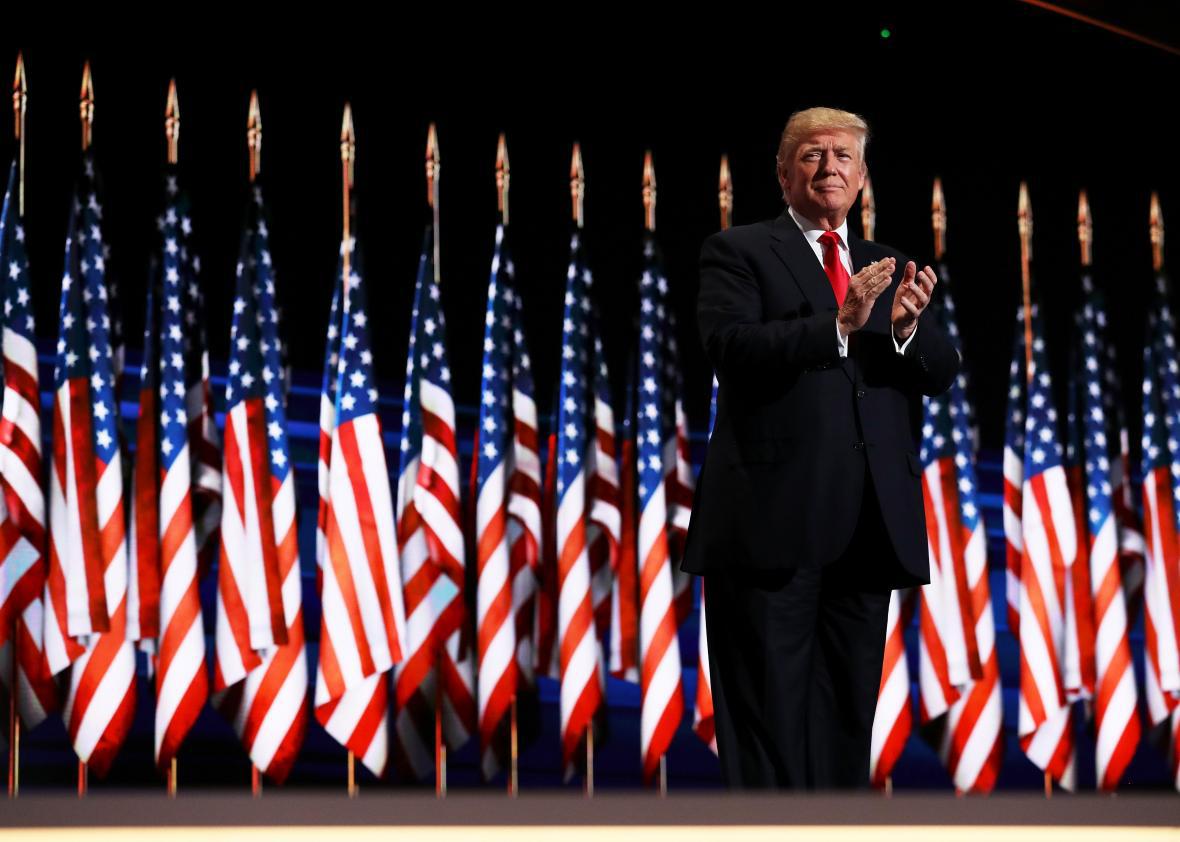Donald Trump needed to do more in his address to the Republican National Convention on Thursday night than prove to gut-level conservatives that he’s one of them. He’s mostly done that, to the chagrin of conservative dissenters who continue to see him as a loathsome fraud. What he hasn’t done is convey any measure of humanity, decency, and concern for others. There were lines in his painfully long convention speech that tried to do just that—for example, his warm references to LGBTQ Americans, and his insistence that children living in crime-ridden inner-city neighborhoods had “the same right to live out their dreams as any other child in America.” But those lines didn’t quite connect. His arrogance and his bluster shone through.
To soften his image, Trump ought to have turned to an unlikely source. He should have taken a page from Pat Buchanan, a man who is in many ways Trump’s spiritual predecessor. Though both Buchanan and Trump have indulged in inflammatory racial rhetoric, and though both stood against the conservative mainstream to champion economic nationalism, the two men couldn’t be further apart in their intellectual sophistication and their sense of poetry. And while Buchanan came to his blend of traditionalism and nationalism honestly, one still gets the sense that Trump simply saw an opportunity to exploit the GOP’s working-class primary electorate and went for it.
If you want to understand the logic behind Trump’s speech, I’d recommend reading The Three Languages of Politics, a little-known gem of a book self-published by economist Arnold Kling in 2013. Kling argues that liberals, conservatives, and libertarians all have different mental shortcuts to make sense of big moral and political questions. Liberals see themselves as the champions of the oppressed, and they celebrate those who stand with the oppressed and against oppressors. Libertarians think in terms of freedom and coercion. The bad guys are those who force others to act against their will while the good guys defend personal choice and voluntary agreement. Conservatives see the world through the lens of civilization and barbarism, and they see themselves as the guardians of institutions that guide us toward civilized behavior by imposing constraints and, when necessary, physical force. Those who threaten the forces of order are the enemy.
To those of us who think of politics in ideological terms, this might not compute. Surely conservatives are believers in free markets, low taxes, and a strong national defense? By that definition, it’s not at all clear that Trump passes muster. But when we think of conservatism as a kind of language or a psychological predisposition, Trump’s appeal makes a lot more sense.
You can see why a conservative might hear Trump’s paeans to “law and order” and his promises to shield law-abiding Americans from dangerous outsiders differently from a liberal. Whereas a liberal might be attuned to the ways police officers abuse their authority, a conservative sees the police as civilization’s first line of defense. Trump’s frequent references to the bravery of the police and the iniquity of President Obama’s (supposed) attacks on law enforcement were about more than giving cops their due. They were about underscoring the fact that Trump is on the side of the forces of civilization.
Though Trump clearly connected with many conservatives on Thursday night, he nevertheless would have done well to study Buchanan’s haunting address to the 1992 Republican National Convention. If you recall the speech at all, it’s probably for its hard-edged call for a culture war. In his evocative conclusion, Buchanan celebrated the National Guardsmen who restored order to riot-stricken Los Angeles, then urged his fellow conservatives to follow their lead: “And as those boys took back the streets of Los Angeles, block by block, my friends, we must take back our cities, and take back our culture, and take back our country.” Naturally, Americans of a more liberal bent couldn’t help but wonder if Buchanan meant to take the cities and the culture and the country back from them. (To be totally clear: He did.)
But there was a more elegiac aspect to Buchanan’s culture war speech, in which he spoke movingly of the women and men he had met on the campaign trail who feared for their economic futures. He urged the Republican delegates to recognize these people as their brothers and sisters:
They don’t read Adam Smith or Edmund Burke, but they come from the same schoolyards and the same playgrounds and towns as we came from. They share our beliefs and our convictions, our hopes and our dreams. These are the conservatives of the heart. They are our people. And we need to reconnect with them. We need to let them know we know how bad they’re hurting. They don’t expect miracles of us, but they need to know we care.
It’s hard to imagine these words coming out of Trump’s mouth, and it’s even harder to imagine Trump saying them with heartfelt sincerity. The Trump who could have pulled that off is a Trump who’d have an excellent shot at winning the White House. Instead, he droned on and on like an aging Latin American caudillo, without any of the impish wit that had previously allowed at least some people to laugh off his nastiness. One day, there will be another conservative candidate who can channel Buchanan’s conservatism of the heart. His speech at the Republican convention on Thursday night proved that candidate will not be Donald Trump.
